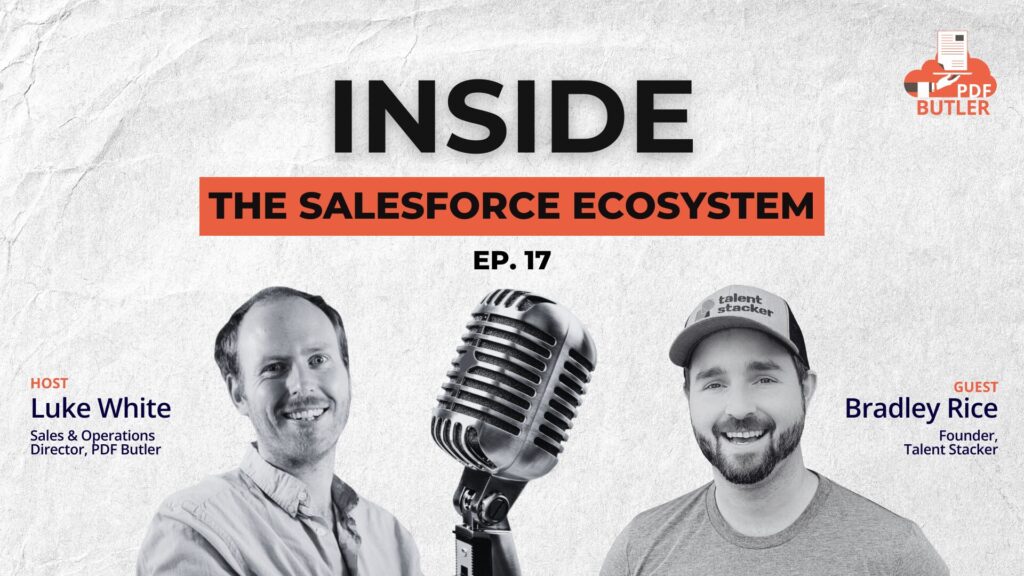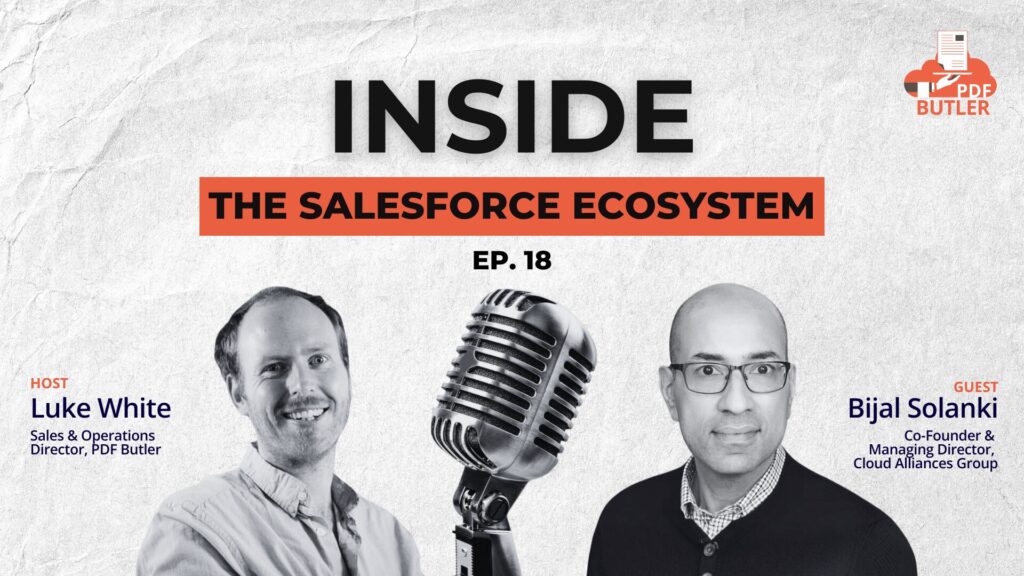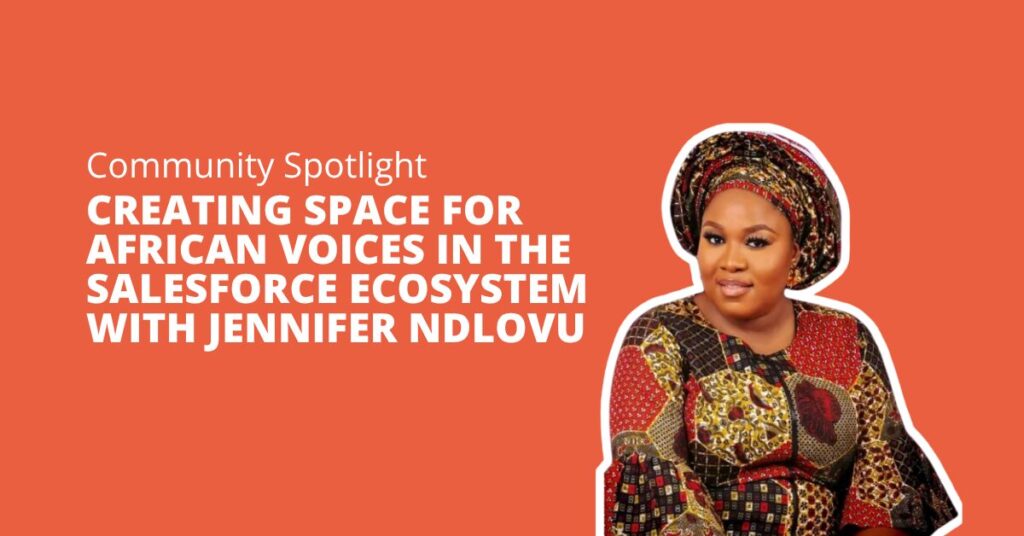Today on Inside the Salesforce Ecosystem, we’re joined by someone who has helped thousands of people kickstart their Salesforce careers: Bradley Rice.
Bradley is the founder of Talent Stacker, one of the most recognized career development programs in the Salesforce community.
Before becoming a full-time entrepreneur and mentor, Bradley spent over a decade working hands-on with Salesforce. From consulting and architecture to marketing automation and leadership roles.
Q: Let’s start at the beginning. How did your Salesforce journey first begin, and what drew you into the ecosystem?
Bradley: Honestly, I am one of those accidental admins.
My ultimate dream was to be a high school economics teacher. I was really passionate about teaching the next generation to understand finances, but in 2010, I could not find a teaching job. So that is how I ended up in the ecosystem, and looking back, it makes sense with everything people see from Talent Stacker today.
Q: What does your day-to-day life look like now? That mixture between Talent Stacker, the mentorship program, and everything else you’re involved in. How do you balance it all?
Bradley: I balance it because I have a team of incredible people. They are talented, but more importantly, they are empathetic. They care about me, the company, each other, our members, and the community. When people truly care about what they are doing, it changes the way you get things done. We focus on what matters instead of chasing projects that only look flashy.
I try to work about 20 hours a week. I used to grind 40 or 50 hours, but when my daughter was born, I wanted a huge amount of time with her. So in 2016 I started working part time. Some weeks I still step up when something important is happening, but most of the time I leave space in my schedule to think creatively instead of staying buried in tasks.
Day-to-day, I still help with support, lead generation, talking to beginners who have never heard of Salesforce, and even frustrated customers who are unsure about what they purchased. I work across every area of Talent Stacker, the Trailblazer Mentorship Platform, and our freelance program. I also keep my finger on the pulse of what people are asking, what their fears are, and whether those fears are real obstacles or things we can help them overcome.
Q: We actually have two people on our team here at PDF Butler (Jeremy and Talia) who are Talent Stackers! But for those who might not know, what exactly is Talent Stacker, and what do you guys do?
Bradley: Basically, we help anyone who wants to transition into a Salesforce career.
I do not care about your background. You could not have a high school diploma. I believe everyone is capable of doing this if it is what they want. I am not here to convince you. If you want it, I can help.
Whether you are in healthcare, education, a stay-at-home parent, or anything in between, we can make that transition happen. Most people already have more skills than they realize.
We also help freelancers. We show them how to find clients, build their brand, deliver great work, understand the back end of the business, and even scale into a consultancy. So we help you get your first job, and if you are already experienced, we can help you get freelance work too.
Q: What do you think has made the program so effective for helping people get their first Salesforce role?
Bradley: I think, in a nutshell, it is creativity.
We built a team and a program that does not care about how things were done 30 or 100 years ago. The way people used to apply for jobs or network is irrelevant now. Tech changes too quickly.
We were not watching competitors or trying to copy anyone. Honestly, when I started Talent Stacker, I did not even know we had competitors. By that point I had already helped sixty or seventy people get into Salesforce through community groups and friends. I knew the process worked. The challenge was figuring out how to scale it and make it approachable for people who might think Salesforce is an MLM or that it means being a salesperson because the word “sales” is in the name.
Q: Two years ago, you launched the Trailblazer Mentorship Platform. What inspired this new initiative, and how does it build on what you’ve learned from Talent Stacker?
Bradley: We were already building a platform that connected job seekers with employers, almost like a dating website where employers could filter profiles, watch videos, and review pre-interview questions.
We created mentor and mentee applications and brought together a team to review them. We want mentees who show dedication, not people who simply ask if we can get them a job. I spoke with about thirty mentors from the old Salesforce program to learn what worked and what did not, and we built from that.
In the first year, we supported around five hundred to six hundred mentees with the help of about seventy mentors. And I always tell people who just got their first job that they often make the best mentors, because they remember exactly what the struggle feels like.
People tell me they’re not ready to be a mentor because they just got a job six months ago.But that actually makes them the perfect mentor. Someone who is 10 years into their career often can’t fully relate to what a beginner is going through. But someone who just lived it can.
Q: You’ve coached and mentored so many people. What’s one piece of advice you find yourself repeating most often to those starting their Salesforce careers?
Bradley: Lean into discomfort.
Do not try to avoid it, because avoiding discomfort means you are not challenging yourself or learning anything new. The things that scare you or frustrate you are usually the things that make you grow. The more time you spend with something, the more comfortable it becomes.
When I was trying to work part time, I reached out to companies hiring full time and said I believed I could do that full time job in part time hours. I was told no many times, sometimes laughed at. One of those companies eventually hired me for five years. It is uncomfortable to push back, but you can.
When you lean into discomfort, difficult conversations become easier. You can calm clients when something feels like a fire. You can handle challenges with confidence. If you get comfortable being uncomfortable, you will find yourself in a better place in life and in your career.



